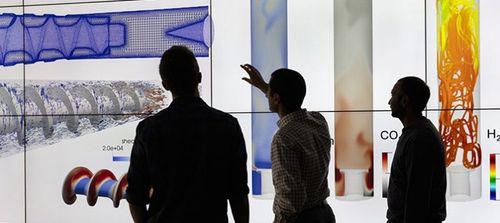DOE: Computational models can accelerate and scale up biomass conversion

Researchers at NREL discuss computational models for bioconversion processes in the Energy Systems Integration Facility in Golden, Colorado. Photo by Joe DelNero / NREL.
March 22, 2024
BY U.S. Department of Energy
Researchers at the National Renewable Energy Laboratory Computational Science Center are hard at work enabling the conversion of biomass to fuels and products at industrial scale. Computational tools can model biomass conversion at scales ranging from small lab beakers to biorefineries, which can help accelerate and de-risk the newest technology developments.
Recent computational studies in biomass conversion have made use of funding from the U.S. Department of Energy's Bioenergy Technologies Office and high-performance computing resources at NREL to investigate and solve complex conversion challenges, such as producing sustainable aviation fuels (SAF).
Three of NREL’s ongoing advanced computing projects include:
Advertisement
Advertisement
- Predicting energy requirements and mechanical failure when feeding solid biomass into a reactor, critical aspects that govern the operation of an entire biomass conversion plant.
- Identifying an industrial-scale pathway to convert biomass to 2,3-butanediol, an important intermediate for downstream production of SAF and chemical products.
- Harnessing computational tools that link simulated conversion steps to build a virtual biorefinery, thus capturing the entire process of biomass conversion from feedstock to fuel.
Learn more about these BETO-funded projects and how NREL is using computational modeling to enable pathways to sustainable biofuels.
Advertisement
Advertisement
Related Stories
Saipem has been awarded an EPC contract by Enilive for the expansion of the company’s biorefinery in Porto Marghera, near Venice. The project will boost total nameplate capacity and enable the production of SAF.
International Air Transport Association has announced the release of the Sustainable Aviation Fuel (SAF) Matchmaker platform, to facilitate SAF procurement between airlines and SAF producers by matching requests for SAF supply with offers.
Alfanar on June 20 officially opened its new office in London, further reaffirming its continued investment in the U.K. The company is developing Lighthouse Green Fuels, a U.K.-based SAF project that is expected to be complete in 2029.
ATR and French SAF aggregator ATOBA Energy on June 19 signed a memorandum of understanding (MOU) to explore ways to facilitate and accelerate sustainable aviation fuel (SAF) adoption for ATR operators.
Greene Tweed, a global leader in advanced materials and high-performance solutions, has released results from a study confirming the compatibility of its fluorine-based elastomer seals with sustainable aviation fuels (SAF).
Upcoming Events










